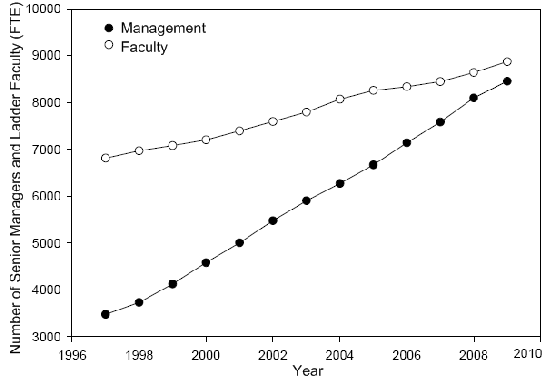Mankiw's claim that college costs are the inevitable result of Baumol's Disease is pure self-serving rubbish.
Everyone who isn't blinded by self-interest sees that the cost of higher education in America--and the way we pay for it, by turning students into debt-serfs-- is unsustainable. Those benefiting richly from the bloated, ineffective bureaucracy see no alternative, of course; their self-serving handwringing would be laughable if it wasn't so destructive to the nation and the economy.
Greg Mankiw, professor at Harvard, recently offered up a typical helping of self-serving handwringing: Three Reasons for Those Hefty College Tuition Bills. Mankiw squeezes out a few insincere (but necessary for PR purposes) alligator tears over the soaring costs of a college degree, and then trots out the usual justifications for maintaining the status quo, which just so happens to reward him so well.
Let's dismantle his bogus justifications one by one.
1. Mankiw predictably trots out the Gold Standard of justifying the absurdly high cost of an often-ineffective and useless college degree: those with college degrees earn $1.5 million more over a lifetime of work than those without degrees.
On the face of it, this offers plenty of justification for $120,000 piles of debt for degrees in Critical Studies, etc.: that extra $1.5 million will easily fund the cost of a 4-year degree.
But this data is completely out of date. Yes, a college degree offered substantial lifetime wage increases back when four years of college cost about as much as a new car, not a new house, i.e. the current cost; but as recent graduates have discovered, a four-year college degree offers little advantage, and substantially underperforms journey-person wages for skilled trades workers such as pipefitters, plumbers, etc.
The exception is of course highly technical degrees in engineering, computer science, biotechnology, etc. But this reality has led to a systemic over-supply of graduates with STEM degrees (science, technology, engineering, math), as the economy does not create paid positions in these fields simply because more people have studied these subjects.
The economy has changed profoundly and structurally in the past 15 years, and the breezy cliche that a college degree automatically boosts lifetime earnings by $1.5 million is no longer supported by current realities. Just having a college diploma offers little advantage, especially when compared to those with real-world skills. Even those with STEM degrees find themselves in a Darwinian struggle to get a job in these fields, a struggle that forces many to get deeper in debt to secure a Masters or PhD.
But alas, tens of thousands of other under-employed college graduates had the same idea, and the job market is over-supplied with graduates holding Masters and PhDs.
Yes, if a student slaves away for 7 years to secure a PhD in computer security, he/she will likely enjoy multiple job offers. But the number of such positions is vanishingly small in an economy of 140+ million workers.
The reality is a college degree no longer offers the leverage it once did, due to simple supply and demand: millions of other people have degrees now, too, including advanced degrees, and the job market doesn't create jobs just because people have degrees.
2. Next, Mankiw claims (with zero factual justification) that teachers enlightening a small groups of students in a classroom (i.e. the standard educrat model that pays Mankiw his fat salary and hefty benefits) is the best and thus the only way to teach.
In other words: garsh, I'm sorry costs are soaring (phony handwringing), but this is the way it has to be; there is no alternative (TINA). This is self-serving rubbish: the better and much more cost-effective way to teach real skills that employers actually need is directed apprenticeships taught by working professionals, accompanied by nearly free digital resources and courses.
I describe this model in detail in my book
The Nearly Free University and the Emerging Economy. Not only does this model offer an order of magnitude reduction in cost (there is no longer any need for a costly campus or hundreds of highly paid administrative staff), it also teaches students real skills in the emerging (i.e. real) economy.
Yes, there will still be a need for the top 200 research universities, but these institutions offer little to nothing to the vast majority of undergraduates who are currently entering debt-serfdom for ineffective or even useless 4-year degrees.
3. Mankiw then invokes every entrenched special interest's favorite high-concept defense for their morbidly high-cost/ineffective bureaucracy: Baumol's Disease, which holds that the cost of violin lessons rises because as the productivity of manufacturing and commoditized services rises, alas, teaching violin is a one-on-one process that is necessarily unchanged from 1741.
Mankiw conveniently overlooks the sordid reality that the academic establishment that rewards him and his fellow smug handwringers so amply depends on an underpaid army of academic ronin, teachers with few benefits and zero security known in the polite self-serving circles of academia as adjunct professors.
Please consider this chart of the University of California system's employment of professors and administration. If we extrapolate the lines into the present, it appears that there are far more highly-compensated seat-warmers in the university administration than there are professors teaching in the classrooms.
In 13 short years, the number of senior administrators shot up by 142% while the number of tenure track professors rose by 29%.
The shortfall in classroom staff has been filled by adjunct professors, educrat doublespeak for poorly paid academic ronin, academics with Masters Degrees and Doctorates who have few realistic chances to secure a tenured teaching position. These academic ronin are typically paid $40,000 or less and receive few if any benefits and no security. Their total compensation (wage/salary plus benefits) is a third or even a quarter of what tenured professors receive.
Their career track has little future; they may be able to switch universities, just as Samurai ronin in Japan might attach themselves to a feudal lord for a time, but their employment will always be contingent and short-term.
Mankiw's claim that college costs are the inevitable result of Baumol's Disease is pure self-serving rubbish: Mankiw's grandiose position atop the academic heap is supported by the toil of a vast army of poorly paid academic ronin, while soaring costs can largely be attributed to entirely useless (in terms of actual learning of useful skills and knowledge) administration and lavish campus facilities--costs that have nothing to do with Baumol's Disease and everything to do with American higher education being a cartel, i.e. an exploitive, parasitic racket that fails most of its students miserably.
The emerging economy enables a 90% reduction in the costs of higher education and a highly adaptive structure of directed apprenticeships in every academic field. The way to learn how to do anything, from journalism to multimedia to pipefitting to philosophy is to start right in under the guidance of a working professional in the field: as Emerson noted, do the thing and you shall have the power.
If we want a vibrant, adaptive, resilient economy, we need to ditch Mankiw and his entire parasitic cartel for a higher education system that actually serves the economy and the nation, rather than an entrenched cabal of self-serving insiders.
Admin note: I will be busy with family commitments this month. As a result, blog posts will be sporadic and email responses will be near-zero. Thank you for your understanding.
NOTE: Contributions/subscriptions are acknowledged in the order received. Your name and email remain confidential and will not be given to any other individual, company or agency.
Thank you, Paul C. ($120), for yet another outrageously generous contribution to this site -- I am greatly honored by your steadfast support and readership.
| |
Thank you, Seth F. ($5/month), your most excellently generous subscription to this site -- I am greatly honored by your support and readership.
|
Read more...



























